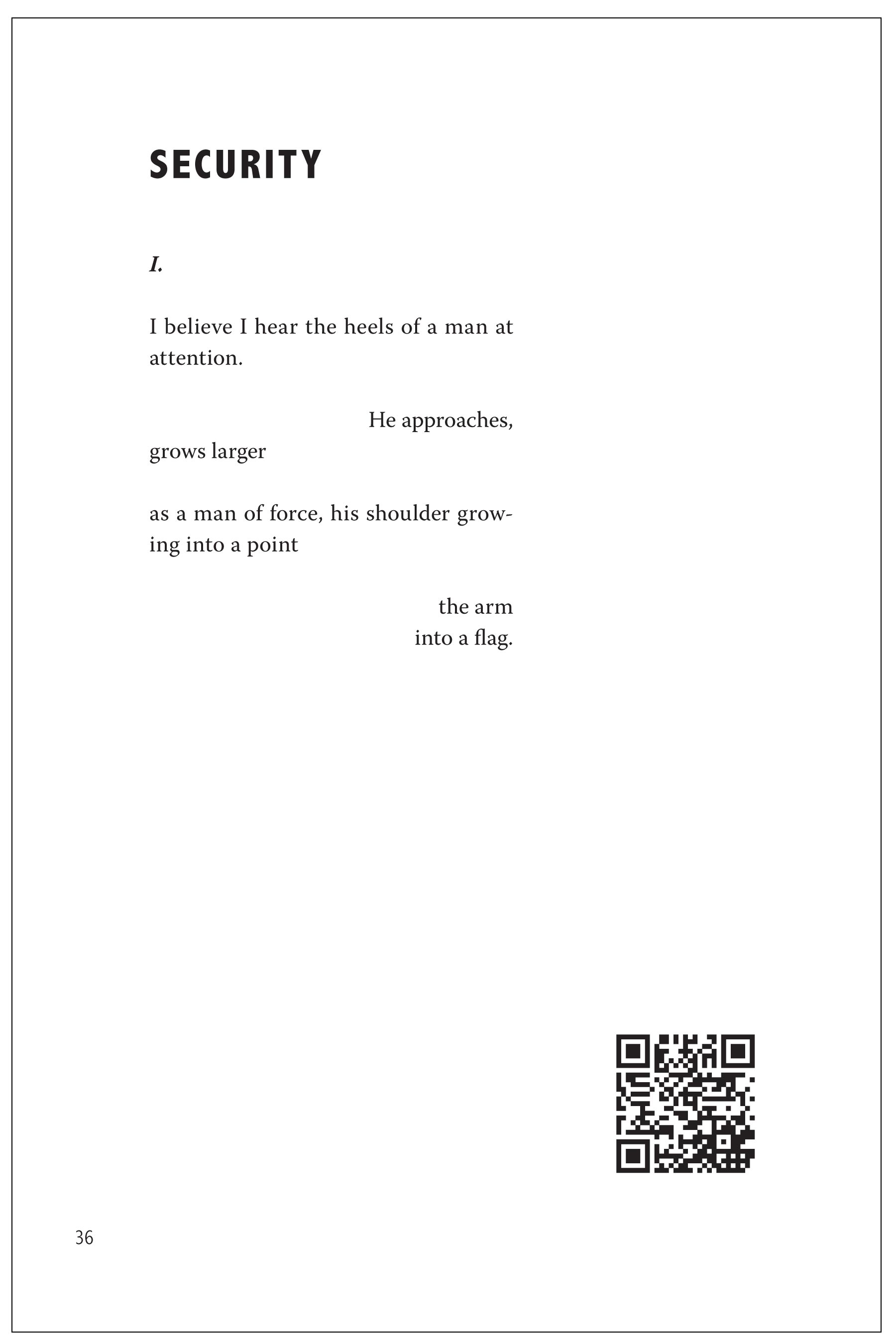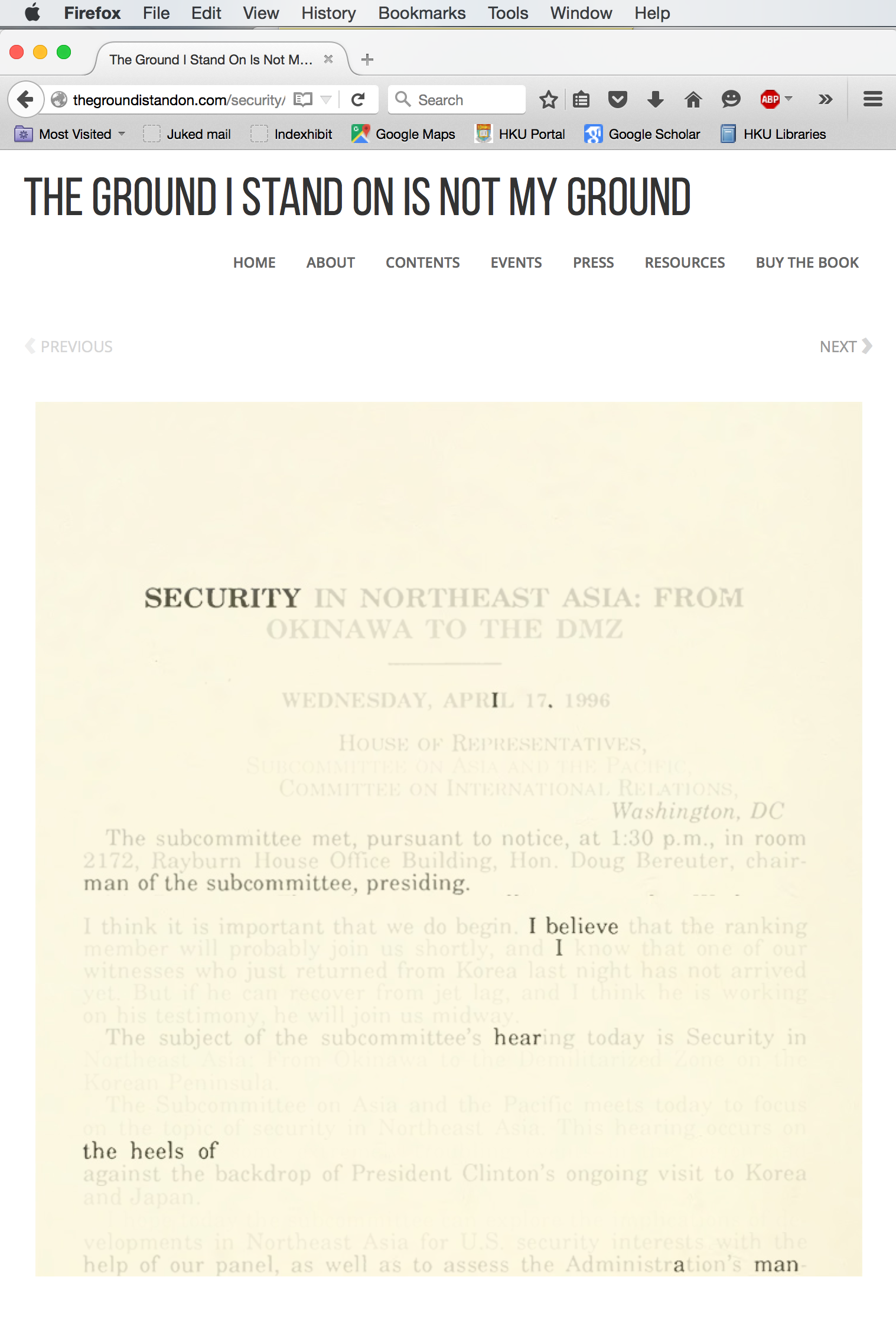


The Ground I Stand On Is Not My Ground was selected by Forrest Gander as winner of the 2014 Drunken Boat Poetry Book Contest. The book is a hybrid of poetry and digital art whose poems manipulate bureaucratic documents related to the Pacific War in Okinawa, where I grew up on a military base. The Ground’s companion website features each poem as an interactive erasure, inviting the reader to participate in revealing and rewriting the original texts. Taken together, the poems and their original texts tell a larger story about the ways we imagine war, and the ways language can be used to record, justify, memorialize, or resist it. The project has been taught widely in creative writing courses and in design courses at Pratt and the University of Idaho, and is garnering scholarly attention as an example of what the critic Evyn Lê Espiritu Gandhi calls “feminist archipelagic poetics.”
The book is available from SPD (Small Press Distribution), Amazon, Powell's Books, and Book Depository. It's also available in Hong Kong at Kubrick Bookstore, Art & Culture Outreach, Growhouse, and the Chinese University of Hong Kong Bookstore.
Praise for The Ground I Stand On Is Not My Ground:
“This is the best book of erasure poems since Srikanth Reddy’s Voyager. Nogues carves critical observations into slow motion (erasure isolating and elongating time) so that we seem to see inside the body’s gestures. The book is an intense meditation on war, riddled with aporia and drawing on many resources— documentary, epistolary, and even rhyming lyric—to create an empathic and deeply affecting experience of contact with the devastation war brings and ‘with the pain about to come.’”
“Collier Nogues is nothing short of brilliant in this necessary book, which lights up a long shadow two big governments have cast on a miraculous island and an indigenous people. Nogues comprehends how any war is a continuum of the same hell, yet each experience is specific: the chronic trauma of surviving amid the dead, the way history makes a “war” a narrative but the participants (victims/survivors/casualties) experience it only in fragments. The speakers of these poems are visionary; they are ‘one of us.’ And if we can see that, we can see what Nogues has envisioned here, see how our world can change in the direction of mercy, human dignity, survival.”
“Collier Nogues, who grew up on a U.S. military base in Okinawa, explores how war has shaped the island of her childhood. Taken together, these poems not only express a desire to erase violence, but they also attempt to map the topography of islands and nations, caves and embrasures, weapons and flags, grace and dread. Nogues is a brave poet who disassembles the official discourses of empire to articulate a dream for an island of peace.”
“The Ground I Stand On Is Not My Ground is artistic, creative, experimental, and politically important–the kind of book people will continue to use to discuss erasure poems and the power of digital media to support poetic innovation.”
Other reviews:
Publisher’s Weekly: ” . . . steady in purpose, cohesive, and surprising . . . an important work.”
Rob McLennan: “There is such a lovely lightly touch across Nogues’ lines and phrases, skipping across the surface of reclaimed text while retaining and repurposing an incredible depth.”
The Found Poetry Review: “One of the major feats of the collection is Nogues’ ability to not only make such powerful work from, sometimes, such austere documents, but also to sequence and create the work with such an eye to using heterogeneous source material…”
Jee Leong Koh at OF ZOOS: “How to matter while you are not able to shelter anywhere between heaven and earth?…this necessary book…lights up the chronic trauma of surviving amid the dead.”
Antony Huen at Cha: An Asian Literary Journal: “[Nogues’s] poetry deserves our best attention.”
Maggie Trapp at Gloom Cupboard: "Nogues reminds us that these are stories that have been manipulated, recast, rewritten, partially forgotten, erased. Nogues’s lines do not seek to paper over these hard truths; rather, her poems remind us that subtexts and rereadings create other stories, new narratives....This collection shimmers."